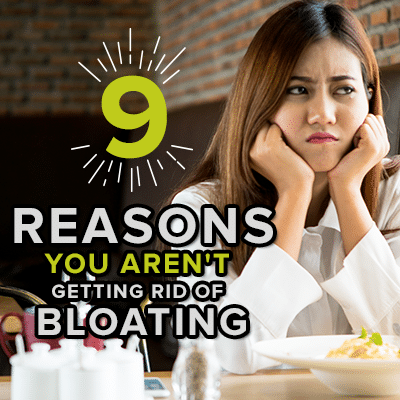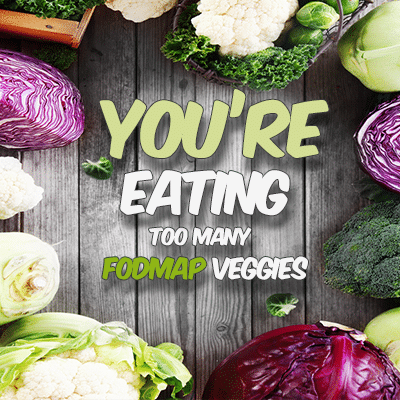9 Reasons You Aren’t Getting Rid of Bloating
 Bloating can range from slightly uncomfortable to downright debilitating.
Bloating can range from slightly uncomfortable to downright debilitating.
When you’re getting rid of bloating it can be tempting to reach for an easy fix such as an over-the-counter medication that seems to alleviate gas rapidly.
However, this can become a frustrating solution as many find that they are quickly bloated again the next time they eat.
This is because most over-the-counter options are not helping the underlying cause of your bloating.
The best way to get rid bloating will depend on the underlying cause.Fortunately, figuring this out doesn’t always require a trip to the doctor.
You might be able to pinpoint what the real issue is by addressing the following nine issues.
Here are some of the most common reasons you aren’t successfully getting rid of bloating.
Your gut bacteria is out of whack
The bacteria in your gut need to exist in a delicate balance for you to feel your best.
When this little ecosystem is thrown out of whack, it can make you feel bloated, nauseous, constipated, and more.
If this continues it can cause other health conditions and even nutrient deficiencies. Additionally, the bacteria can colonize in the wrong spot within your gastrointestinal tract.
For example, when certain bacteria settle in the small intestine, this can cause serious bloating.
This is why it isn’t a good idea to ignore persistent bloating.
It could be a sign of something that needs your full attention. Supplements known for getting rid of bloating by addressing the underlying issues include Atrantil and digestive enzymes.
You’re taking medications that cause bloating
There are several medications that can cause bloating, these include:
- Antibiotics – While antibiotics are sometimes necessary, they can wreak havoc on the gut microbiome.
When antibiotics kill off harmful bacteria, they also harm beneficial bacteria. Though your gut can make a comeback after a round of antibiotics, it helps if you support the beneficial bacteria by taking probiotics.
- NSAIDS – Over-the-counter drugs like Advil or aspirin can cause inflammation of the gut lining and leave you feeling bloated. Try not to take these unnecessarily.
- Painkillers – Opiates are known for causing constipation and bloating. Again, the best thing to do here is avoid taking these unnecessarily.
- Birth control pills – These can cause fluid retention and bloating due to the estrogen. Opting for a form with lower estrogen sometimes improves bloating.
You have an unidentified food sensitivity
Food sensitivities are notorious for causing bloating. If your bloating is a regular occurrence, try to pay attention to what you’ve eaten earlier that day and see if there’s a pattern.
The most common food sensitivities include:
- Milk
- Eggs
- Gluten
- Tree nuts
- Fructose
- Fish
- Shellfish
You can have a food sensitivity that’s mild and has gastrointestinal reactions as opposed to allergy-like reactions.
Also, it’s not uncommon for food sensitivities to wax and wane in their strength, which can make them trickier to identify.
You have an undiagnosed gut condition
Bloating is sometimes a sign of gastrointestinal disorders.
These can include inflammatory bowel disease, irritable bowel syndrome, celiac disease, and ulcerative colitis – to name a few.
If your bloating is severe or has lasted longer than a week, you should make an appointment with your doctor.
Ignoring a gut digestive disorder can further complicate matters down the road.
You’re eating too fast
You might be surprised to hear that something as simple as eating too fast can cause bloating. But this is because you’re swallowing air when you eat too fast.
On top of that, you could end up eating more than you need because you’re scarfing down food before your brain realizes what’s there and sounds the leptin alarm (your satiety hormone) for you to stop.
Don’t wolf your food down. You may find the cause of your bloating is as simple as slowing down and enjoying your meal.
You’re eating too many FODMAP veggies
While vegetables are great for you, too much of a good thing could be causing your bloating.

Vegetables high in FODMAPs (a group of carbohydrates) can cause bloating.
If you get a bloated stomach after eating, it could be the types of vegetables you’re eating or that you’re a bit more sensitive to FODMAPs.
These include:
- Dark leafy greens
- Beans
- Lentils
- Broccoli
- Cabbage
- Cauliflower
- Sprouts
- Onions
Similarly to how you’d identify a food sensitivity, you can find out if veggies high in FODMAPs are the culprits when you pay close attention to what you’ve eaten recently before becoming bloated.
You might even want to consider keeping a food journal. Fortunately, there are apps that make tracking your food consumption a breeze.
You aren’t drinking enough water
When you aren’t drinking enough water or are participating in activities that can dehydrate you (such as sports, drinking alcohol or eating salty foods) this causes your body to hold on to water.
This process can slow your digestion, causing you to become constipated, which then makes you feel bloated. Try drinking more water to see if that helps your bloating.
You’re constipated
Constipation occurs when stool stays in your intestines, which leads to a buildup of waste and gas.
Constipation causes bloating, gas, and stomach pain. Common causes of constipation include not eating enough fiber, being overly stressed, being dehydrated, an imbalance in the gut flora, and not exercising enough.
Just as you should find the underlying cause with your bloating, if you’re regularly constipated be sure to try and find the cause.
They could be one in the same!
You’re treating your bloating with things like Gas-x
Bloating remedies such as a Gas-x don’t identify or treat the underlying cause and are only a temporary solution.
If you’re relying on medications such as these for getting rid of bloating, you are only going to find a temporary solution.
Instead, try and identify the root cause so you can take the necessary steps to find lasting relief.
Try Atrantil For Getting Rid of Bloating
Unlike most quick fixes, Atrantil uses a three step process to stop gas producing bacteria from causing your bloating.
Peppermint leaf, quebracho, and horse chestnut work together to interrupt harmful bacteria, get them to go back into the colon where they belong and offer you relief.
Getting rid of bloating is easy with Atrantil, simply take one capsule with a meal and you’ll not only experience fast relief – you’ll experience lasting relief.
This is because Atrantil doesn’t put a bandaid on the problem, it addresses the root cause of bloating.